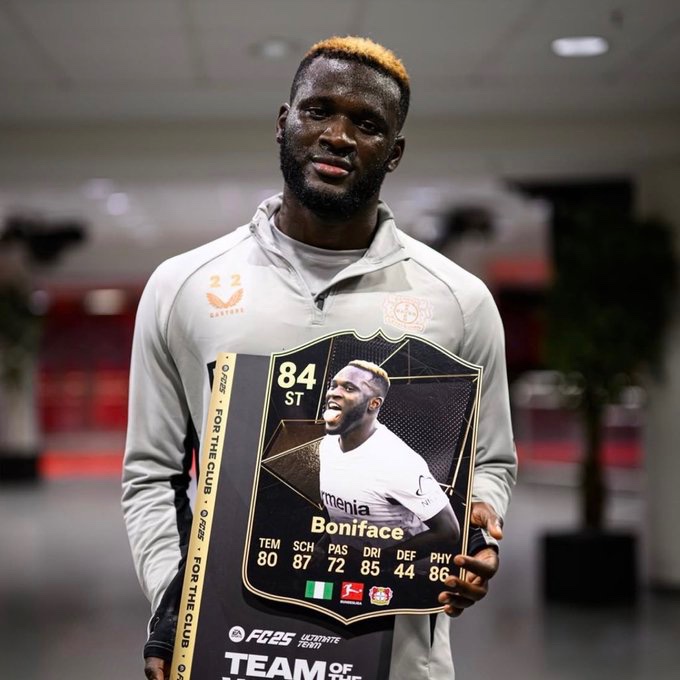
Breaking: Leverkusen Drop Bombshell on Boniface’s Future Amid AC Milan Transfer Talks

The European summer transfer window has been filled with surprises, twists, and endless speculation, but the latest revelation out of Germany has shaken the football world in a way few expected. Bayer Leverkusen sporting director Simon Rolfes has made a blunt, almost startling statement about the future of Nigerian striker Victor Boniface, confirming that his potential move to Serie A giants AC Milan hinges on a very clear condition. In his words: “If Boniface comes back to Leverkusen, the AC Milan deal will be over. That’s no big secret.” Those words, sharp and direct, have immediately set off a storm of speculation across the footballing community, sparking questions not only about Boniface’s immediate future but also about the strategies being employed by two of Europe’s most respected clubs.
Victor Boniface has been one of the most talked-about strikers in European football over the past year. His meteoric rise with Bayer Leverkusen, especially during their historic Bundesliga-winning season, cemented his reputation as a lethal forward capable of scoring, assisting, and bullying defenders with his strength and speed. Despite being plagued by injuries that sidelined him for portions of the campaign, Boniface’s contributions were pivotal. His goals, his pressing, and his presence on the pitch all became vital elements in Xabi Alonso’s attacking machine. However, as with every breakout star in Europe, it was only a matter of time before other big clubs came calling, and AC Milan, still searching for a reliable long-term successor to their aging strikers, quickly zeroed in on the Nigerian.
Milan’s interest in Boniface has been no secret. Italian media outlets have been running stories for weeks about the club’s desperate need for a fresh and dynamic centre-forward to spearhead their attack. Olivier Giroud, though experienced and dependable, has reached the twilight of his career, and while Milan boasts young forwards, none has truly seized the mantle of being the club’s consistent goal machine. In Boniface, they see a blend of youth, strength, and proven talent, a player who could bring back the fearsome striking presence that has been missing since the days of Andriy Shevchenko. But Bayer Leverkusen’s stance, revealed so publicly by Rolfes, has made it clear that this will not be an easy transfer saga to close.
The director’s words underline two crucial points. First, Leverkusen are not in a position where they feel compelled to sell. Unlike many clubs who offload their stars under financial pressure, the German champions are in a place of strength. They have secured Champions League football for next season, they boast one of the brightest managerial talents in Europe in Alonso, and they have financial stability thanks to their Bundesliga triumph. Second, the statement strongly suggests that Leverkusen are willing to hold their ground and only entertain Milan’s offer if very specific conditions are met. In other words, if Boniface returns to training camp in Germany and reintegrates with the squad, Milan’s chances of signing him will all but vanish.
This no-nonsense approach from Rolfes is not surprising to those who know how German clubs operate. Leverkusen, like many of their Bundesliga counterparts, pride themselves on discipline and clarity in their negotiations. For them, there is no need to engage in endless speculation or play the media game. By going public with his words, Rolfes has essentially issued an ultimatum: Milan must act decisively and fast if they want Boniface, because once the player sets foot back at the BayArena, all talks are off the table. It’s a risky but calculated strategy. On one hand, it pressures Milan to accelerate negotiations and meet Leverkusen’s terms. On the other, it could also backfire if the Italian club decides to walk away, leaving Boniface in Germany, possibly unsettled by all the noise surrounding his future.
The timing of this statement is equally fascinating. The transfer window is entering its decisive phase, with clubs scrambling to finalize deals before the new season begins. AC Milan are under pressure from their fans, who have grown frustrated with the lack of attacking reinforcements. Their rivals, Inter Milan, have already strengthened key areas of their squad, and Juventus, under new leadership, are making bold moves in the market. Milan, meanwhile, cannot afford to stumble into another season without a top-quality striker. For them, Boniface represents not just an option but perhaps their only realistic chance of securing a world-class forward before the window closes. That is why Rolfes’ words sting even more. He has placed the ball squarely in Milan’s court, and their next steps will define the outcome of this saga.
For Boniface himself, the situation is delicate. As a player, he has always shown humility and focus, rarely allowing the noise around transfers to distract him from his football. Yet it would be unrealistic to think he is not aware of the magnitude of this potential move. Playing for AC Milan, one of the most iconic clubs in football history, would be a dream for any young striker. The San Siro, the Italian culture of football, and the chance to follow in the footsteps of legends all make this opportunity tantalizing. At the same time, Boniface has blossomed under Alonso’s system at Leverkusen, and leaving a team on the rise, with ambitions of defending their Bundesliga crown and challenging in the Champions League, is no easy decision. His future is a crossroads between loyalty to the project that built him and the lure of a new adventure in Serie A.
The Nigerian striker’s fanbase has been buzzing ever since Rolfes’ words hit the media. On social media platforms, debates rage on about whether Boniface should push for the move or stay put. Nigerian fans, proud of their compatriot’s achievements, are divided. Some believe AC Milan would give him the global platform to cement his status as one of Africa’s finest exports, while others argue that remaining at Leverkusen, under a stable system with guaranteed playing time, would be better for his long-term development. European pundits, too, are weighing in, with many praising Leverkusen’s firm stance as an example of how clubs should resist being bullied into selling their stars.
As the days tick by, all eyes will remain on the negotiations. Milan’s directors are under intense pressure to make the deal happen, and every passing day without progress increases the risk of losing Boniface entirely. For Leverkusen, the stance is clear: they are in control, and they will not bend unless the conditions they have set are met. For Boniface, the next weeks could determine the trajectory of his career, shaping whether he becomes the face of Leverkusen’s European ambitions or the new hope of Milan’s attack.
What is certain is that Rolfes’ comment has changed the dynamics of this transfer saga. It has stripped away the usual layers of secrecy and polite diplomacy, laying bare the stakes and the conditions. Milan must now decide whether they have the financial muscle and the determination to meet Leverkusen’s demands or whether they will back away and leave the Nigerian star in Germany. Until then, the footballing world watches, waits, and speculates. One thing is clear: the future of Victor Boniface has become one of the hottest stories of this transfer window, and its resolution will reverberate across Europe.


